Kluski Śląskie (Silesian Dumplings) are traditional Polish dumplings that come from the Silesia region but are also very popular all over Poland. They are usually served with some kind of meat and gravy or mushroom sauce. They are made with just cooked mashed potatoes and potato starch (sometimes an egg). They are easy to make and kids love them!
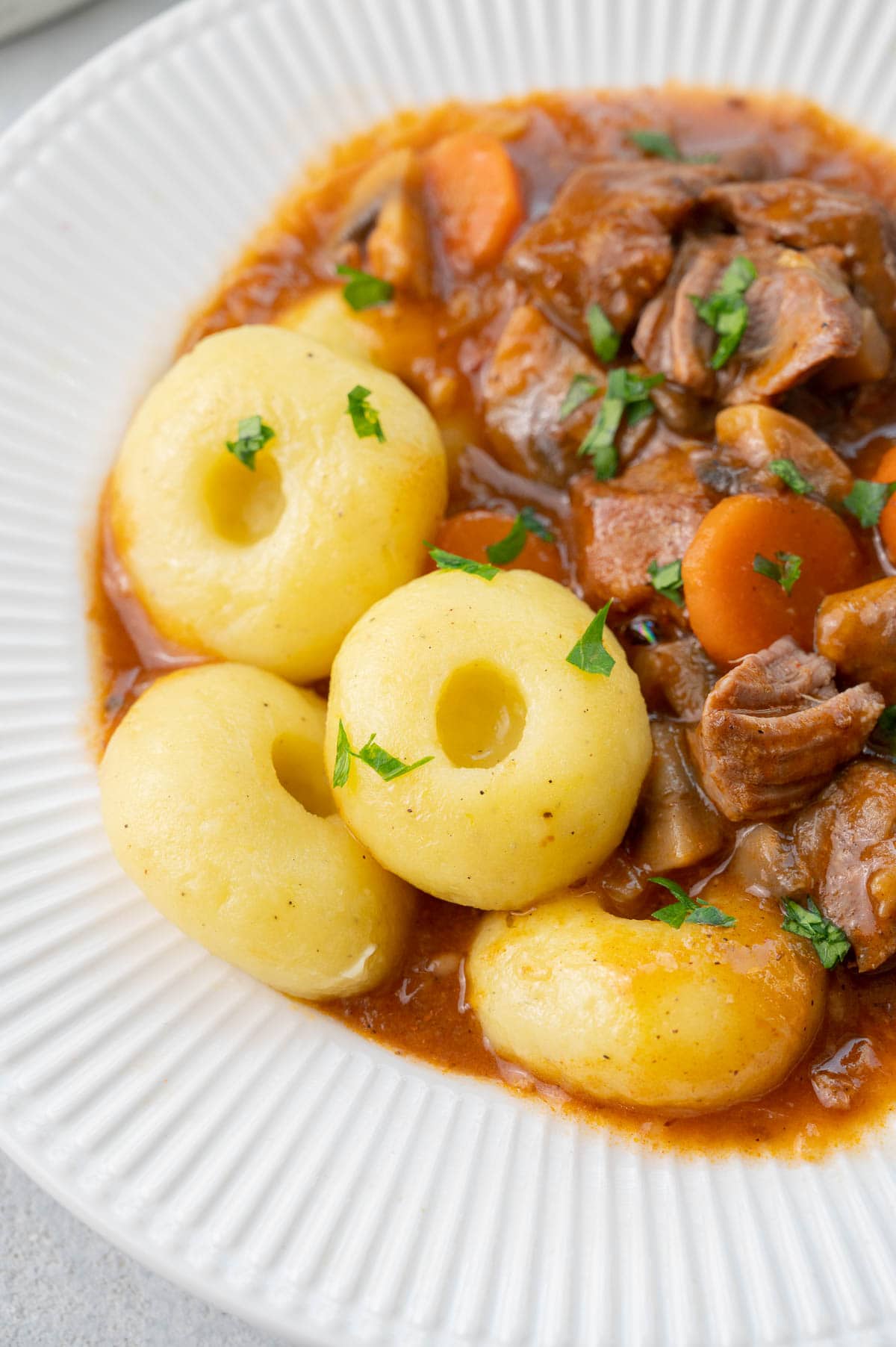
Kluski
If you have never eaten kluski slaskie you may be surprised with their texture. They are soft and tender but also chewy and a little bit gummy at the same time. This is just how they are. Their texture resembles a bit the texture of the mochi dessert (but just slightly).
Kluski in the Polish language is a word that can mean either some kind of dumplings or pasta!
Other kluski recipes include:
- kluski noodles – long noodles that are served in a soup, this is an informal term for all kinds of pasta
- kluski kładzione – soup noodles that are spooned into hot liquid
- kopytka – very similar to kluski slaskie but made with regular all-purpose flour instead of potato starch, their shape is also different
- kluski leniwe (also called lazy pierogi) – there are two kinds: they are made with cheese, eggs, and flour or cheese, potatoes, eggs, and flour
- kluski lane – watery batter is poured into hot liquid
- pampuchy – also called kluski na parze (steamed dumplings)
- pyzy ziemniaczane – round potato dumplings with a savory filling (usually meat filling) or sweet filling (knedle)
Ingredients
Here’s what you need to make kluski śląskie:
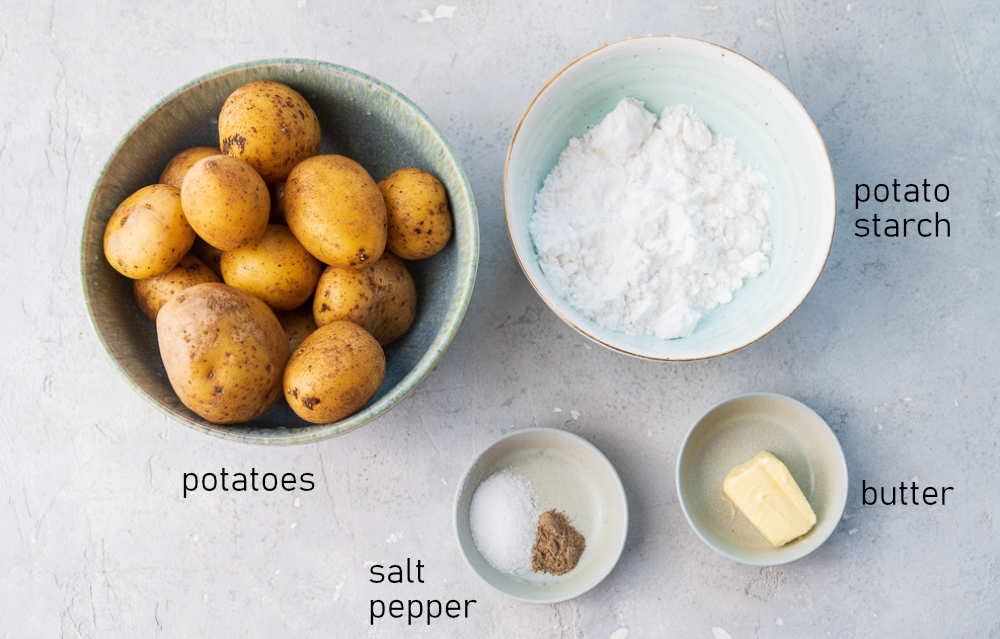
These dumplings are really simple and made with just 3 ingredients but Polish people still fight over how to make them. Potatoes and potato starch are the basis of each recipe but some people claim they should be made without an egg and some people say they should be made with an egg. After some of my own kluski failures, I made 4 batches and tested them side by side to determine which recipe is really the best.
I’ve made a batch with:
- just potatoes and potato starch – these kluski were the closest to what I’ve eaten in the Silesia region
- potatoes + potato starch + soft butter – kluski dough made with butter was so much better, slightly less tough and chewy, with a delightful butter flavor, they were also easier to form
- potatoes + potato starch + an egg – these kluski were pretty similar to the potatoes+potato starch kluski, they were just slightly more tough, but the difference was really small
- potatoes + potato starch + an egg + soft butter – these kluski were too soft, which may be a good thing but they were just too different from the ‘real thing’ that is supposed to be chewy and a little bit gummy (real kluski slaskie resemble a bit mochi with their texture)
For me, the clear winner was the second recipe which is just potatoes, potato starch, and a touch of soft butter. They were still chewy like the real kluski should be but a touch softer with a delicious butter flavor.
Substitutions:
- If you want to add an egg anyway, feel free to add 1 large egg to this recipe, instead of butter.
- Please try to use potato starch and not corn starch. Corn starch can be used, in the same amount, but the dumplings just won’t taste that good, the potato flavor will be diluted.
- Do not use flour, this would be a different recipe – you would make kopytka.
- Use mealy/starchy potatoes for this recipe. Do not use waxy potatoes.
How to make kluski slaskie step by step
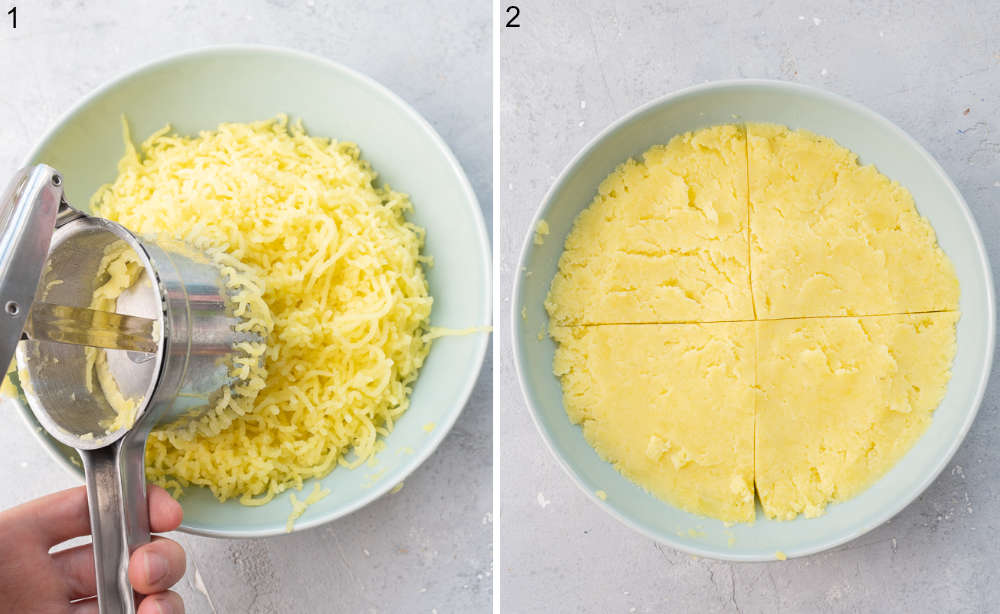
STEP 1: Peel and cook the potatoes until soft.
Mash the potatoes (preferably with a potato ricer) and add to a large bowl.
STEP 2: Press the potatoes into an even layer and divide them with a knife into 4 equal parts.
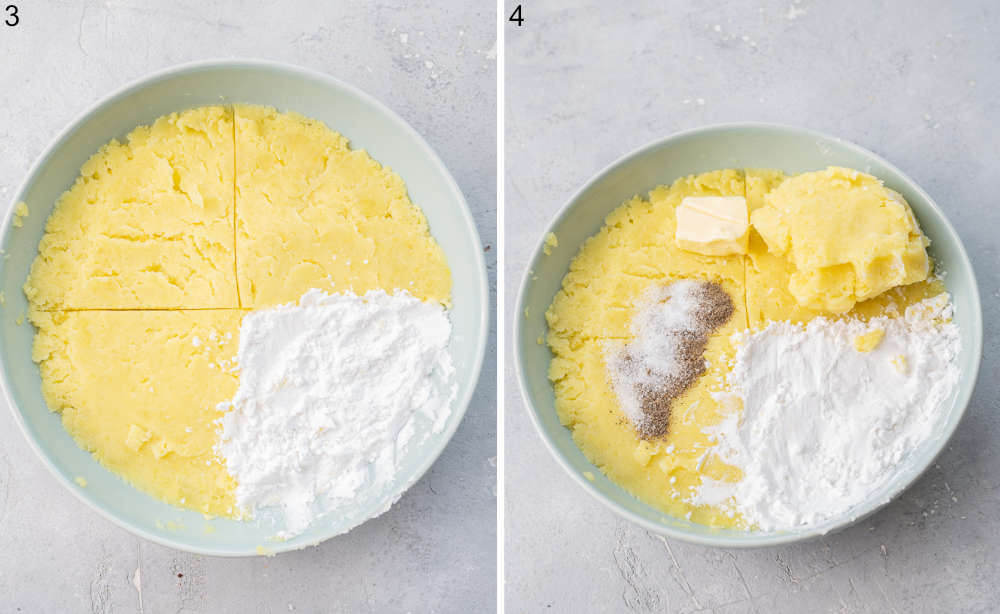
STEP 3: Take out one part of the potatoes out of the bowl. Add the potato starch in place of the removed potatoes (see photo above).
STEP 4: Add the potatoes back to the bowl along with soft butter. Season the dough with salt and pepper.
This is an old-fashioned way to make this recipe. You should have the same amount by volume of the potato starch as 1/4 of the potatoes that are taken out of the bowl. If you don’t want to use this method, just measure out all the ingredients in grams and add them to the bowl.
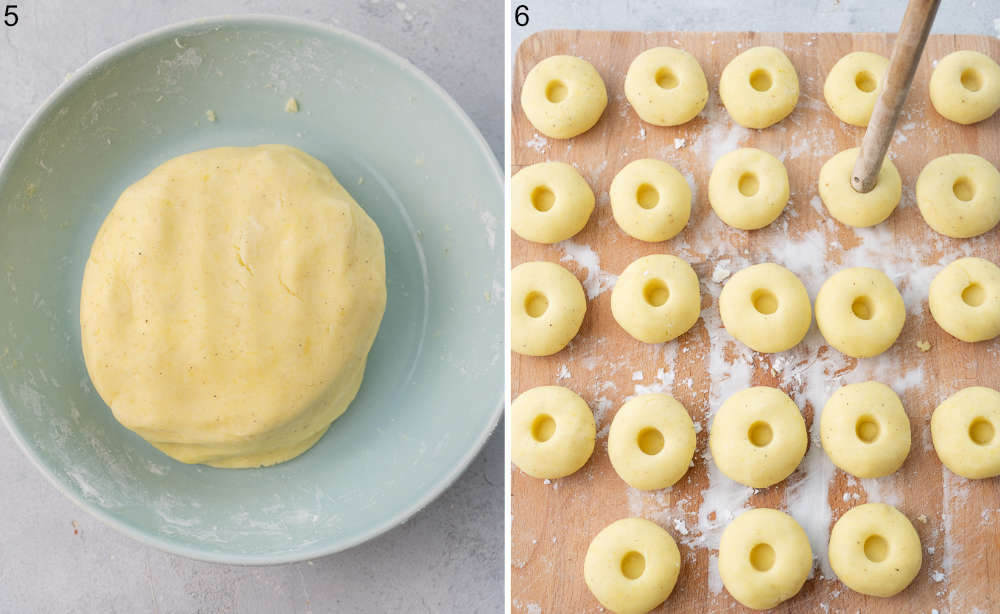
STEP 5: Knead a smooth dough.
STEP 6: Shape balls from the dough in the size of a walnut. Flatten each ball and place it on a wooden board / baking sheet.
Using the end of a wooden spoon, make an indentation in the middle of each flattened ball.
In the meantime, bring a large pot of salted water to a boil, lower the heat to a gentle simmer.
Cook 8-10 kluski at a time, stir them with a wooden spoon after adding them to the pot to prevent them from sticking to the bottom.
When kluski float to the surface, cook them for 3 minutes then remove them from the pot with a slotted spoon. Repeat with the remaining kluski.
Enjoy!
Storage
Storing: You can store cooked kluski in the fridge for up to 3 days. Reheat in butter in a pan.
Do not store uncooked kluski.
Freezing: You can freeze kluski for 3-4 months. Freeze them on a baking sheet (they should not touch), then transfer to bags or containers. Thaw directly in simmering water until warm.
Do not freeze uncooked kluski.
What to serve them with
- any meat and gravy dish
- Polish pork stew (gulasz wieprzowy) – pictured
- mushroom sauce
- chanterelle mushroom sauce
- creamy dill sauce
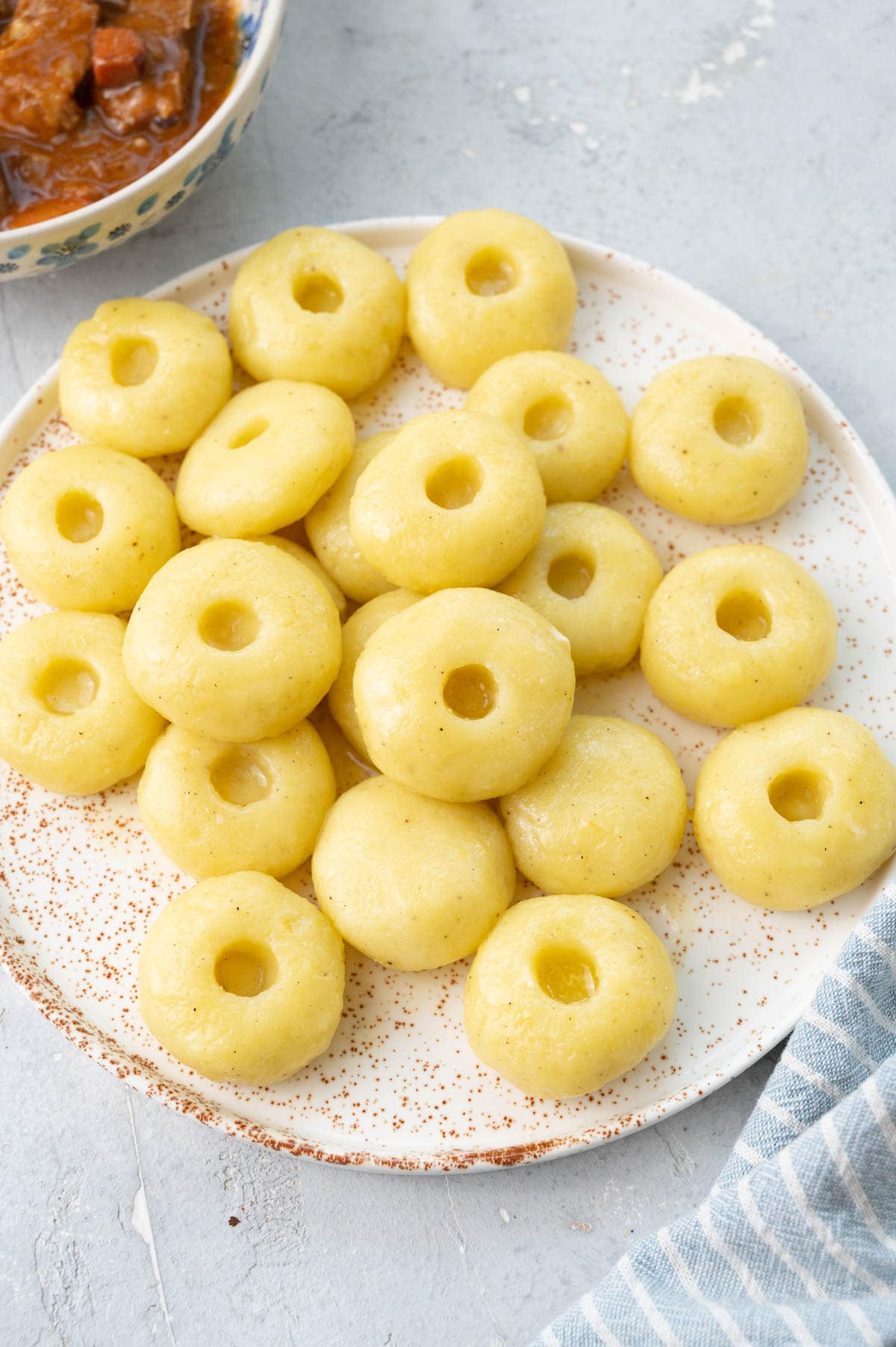
Did you make this recipe? RATE THE RECIPE or tell me in the COMMENTS how you liked it! You can also add a photo of your dish. It would make me very happy and will help other readers. Thank you!!
Kluski Śląskie (Silesian Dumplings)
Ingredients
- 1 1/2 lbs (680g) starchy potatoes
- about 3.5 oz (100g) potato starch see the instructions
- 1 1/2 tablespoons (22g) soft butter
- 1 1/4 teaspoons fine sea salt or to taste
- 1/4 teaspoon ground black pepper or to taste, you can omit adding pepper
Would you like to save this?
Instructions
- Peel and cook the potatoes until soft.
- Mash the potatoes (preferably with a potato ricer) and add to a large bowl.
- Press the potatoes into an even layer and divide them with a knife into 4 equal parts. Take out one part of the potatoes out of the bowl. Add the potato starch in place of the removed potatoes. Add the removed potatoes back to the bowl along with soft butter. Please see the photos in the body of the post for reference!
- Season with salt and pepper and knead a smooth dough.
- Note: This is an old-fashioned way to make this recipe. You should have the same amount by volume of the potato starch as 1/4 of the potatoes that are taken out of the bowl. If you don't want to use this method, just measure out all the ingredients in grams and add them to the bowl.
- Shape balls from the dough in the size of a walnut. Flatten each ball and place on a wooden board / baking sheet.
- Using the end of a wooden spoon, make an indentation in the middle of each flattened ball.
- In the meantime, bring a large pot of salted water to a boil, lower the heat to a gentle simmer.
- Cook 8-10 kluski at a time, stir them with a wooden spoon after adding them to the pot to prevent them from sticking to the bottom.
- When kluski float to the surface, cook them for 3 minutes then remove them from the pot with a slotted spoon. Repeat with the remaining kluski.
- Enjoy!
Notes
- If you have never eaten kluski slaskie you may be surprised with their texture. They should be soft and tender but they will be chewy and a little bit gummy at the same time. This is just how they are. Their texture resembles a bit the texture of the mochi dessert (but just slightly). This is caused by the potato starch.
- The dough should be easy to work with. If the dough is dry or crumbly, add more butter. If it’s sticky, add more potato starch.
- The dough should not be crumbly. If the dough is crumbly, another reason could be that the potatoes are cold. If you’re using leftover cooked potatoes, warm them up and the dough will be much easier to work with.
- Make sure the water is not boiling rapidly, it should just gently simmer or your kluski will fall apart.
- Do not use flour instead of potato starch. This would be a different recipe and you would make kopytka.
- You can add 1 large egg instead of butter.
- Calories = 1 serving (1/4 of the recipe). This is only an estimate!


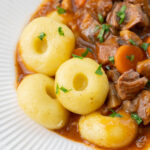
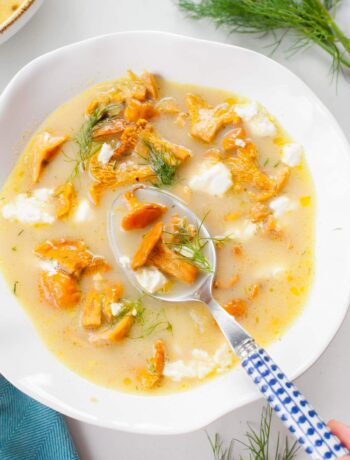
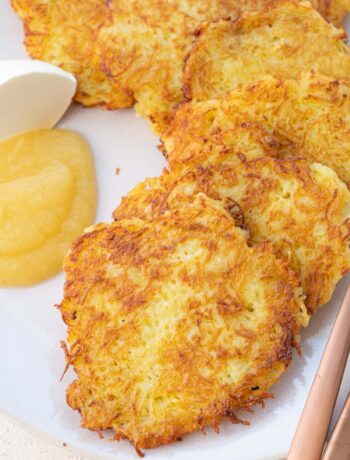
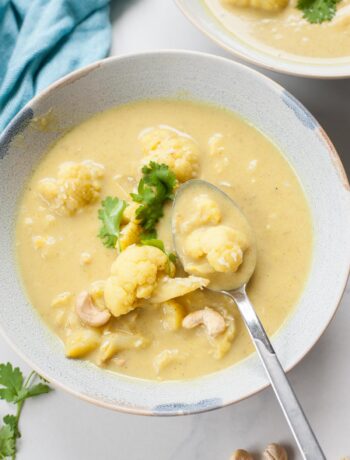
4 Comments
Findel
22 June 2023 at 01:11Divine – can’t stop eating them with anything really – reheated left overs in a sauce.
Aleksandra
22 June 2023 at 14:47yes, they´re that good! thank you for trying out the recipe!
Andy Bibik
16 February 2025 at 20:53Absolutely delicious. Just as I remeber them as a child. I am from Slask.
Aleksandra
16 February 2025 at 20:58I’m glad the recipe worked well for you, thank you for leaving the comment!